Key takeaways:
- Wedding insurance offers crucial protection against unforeseen circumstances, providing peace of mind during the planning process.
- Types of policies include liability and cancellation coverage, with options like “all-perils” and named-perils available for cancellation insurance.
- Evaluating personal risks and comparing insurance providers is essential to find suitable coverage and reliable customer service.
- Personal experiences highlight the importance of understanding policy details and having supportive insurance agents for a smooth claims process.
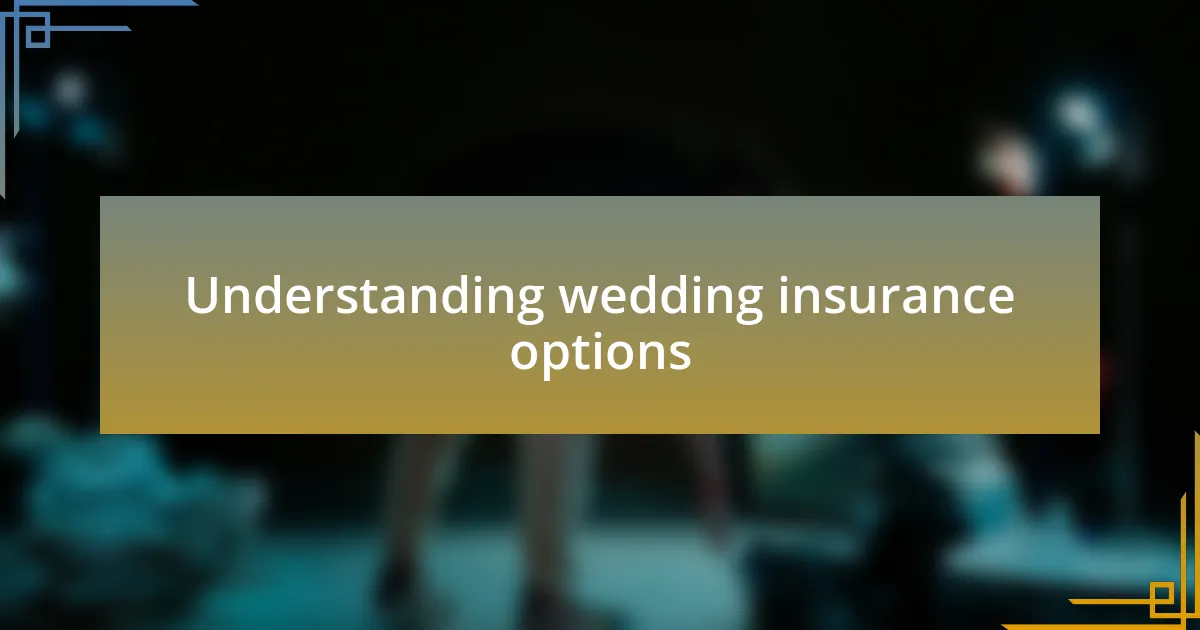
Understanding wedding insurance options
When I first started looking into wedding insurance, I felt overwhelmed by the options available. I remember sitting with a steaming cup of coffee, wondering if I really needed the coverage. The reality is, accidents can happen, whether it’s a vendor flaking out or unexpected weather ruining an outdoor ceremony, so I quickly realized the peace of mind insurance offers can be invaluable.
As I dug deeper, I discovered that policies typically cover various aspects, including cancellation, liability, and damage to the venue. Each category was like a layer of protection, each with its own nuances. For instance, I learned that while cancellation insurance might guard against unexpected events, liability coverage can protect against mishaps that might occur during the reception—like a guest tripping over the dance floor. How could I not consider these risks?
The emotional weight of planning a wedding can be heavy, and adding insurance into the mix might feel like just another chore. But reflecting on my own experience, I found that knowing I had a safety net allowed me to focus on the joy of the moment rather than fixating on all the things that could go wrong. In my mind, the small investment in insurance was a way to safeguard my dreams while embracing the excitement of my special day.
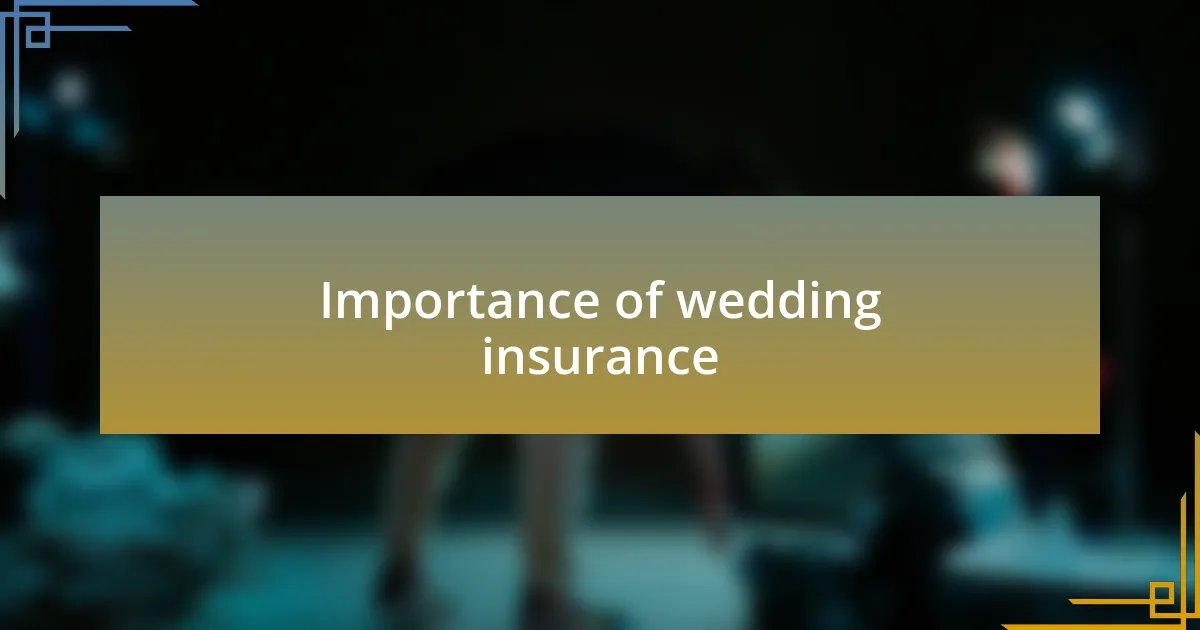
Importance of wedding insurance
The importance of wedding insurance cannot be overstated. I remember a friend who had planned her dream wedding for over a year only to face a sudden venue closure just weeks before the big day. Her insurance policy not only saved her financial investment but also turned what could have been a stressful crisis into a manageable hiccup. That turned out to be a lifesaver for her peace of mind.
When you consider the amount of time, effort, and money that goes into a wedding, why would you risk it all on unforeseen circumstances? In my case, knowing that I had coverage for potential cancellations put my mind at ease. It allowed me to fully immerse myself in the planning process, rather than worrying about what might go wrong—a true gift in the midst of all that excitement.
Ultimately, I believe wedding insurance serves as a symbol of preparedness and resilience. It reminds us that while we can’t control every aspect of our wedding day, we can still take proactive steps to shield ourselves from the unexpected. Isn’t that a comforting thought? After all, this day is about celebrating love, not stressing over potential problems.
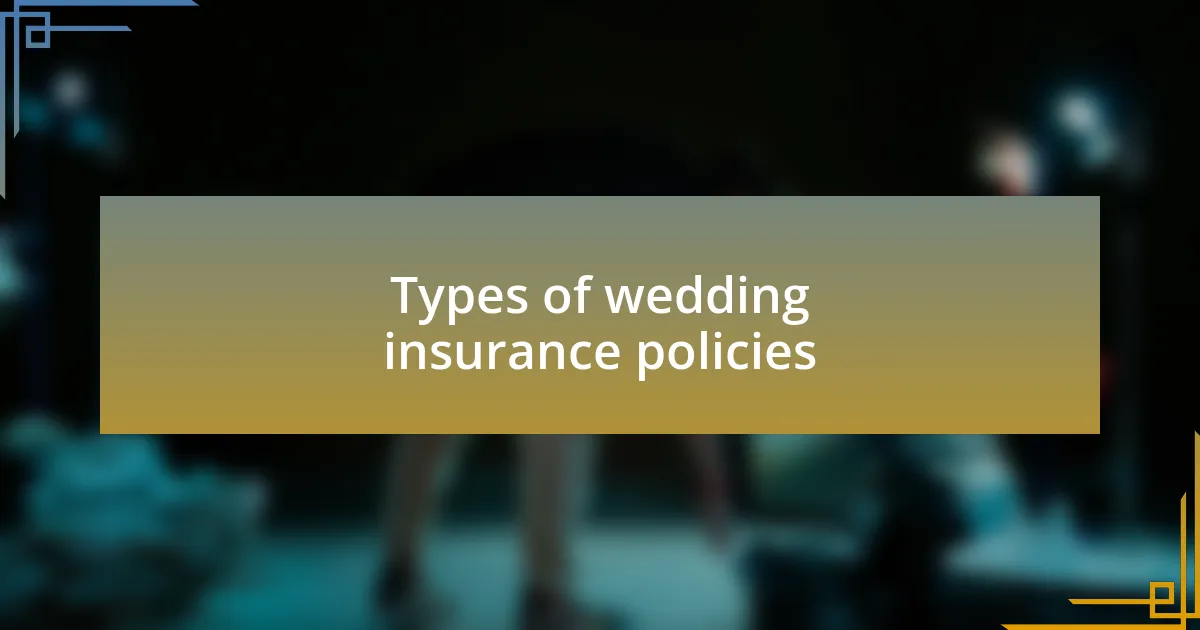
Types of wedding insurance policies
When it comes to wedding insurance, there are primarily two types of policies to consider: liability coverage and cancellation coverage. I knew I needed both, especially after hearing horror stories about couples being held accountable for accidents at venues. Liability coverage protects you financially in case something happens at the event, while cancellation coverage saves you in the event of unforeseen circumstances forcing you to postpone or cancel the wedding.
Among the cancellation policies, there are different options like “all-perils” and named-perils coverage. I found it intriguing how all-perils policies cover a wide range of potential issues, making them more comprehensive. However, in my research, I discovered that named-perils coverage is less expensive—offering protection only against specific risks outlined in the policy. Deciding which one suited my needs felt like a balancing act between my budget and peace of mind.
Additionally, some insurers offer specific add-ons, such as coverage for wedding attire or photography. Personally, I opted for attire coverage because I wanted to ensure that if something happened to my dress, I wouldn’t end up in a panic. I remember vividly the moment I tried it on for the first time; losing it felt unimaginable. Isn’t it comforting to think you can safeguard those precious elements of your special day?
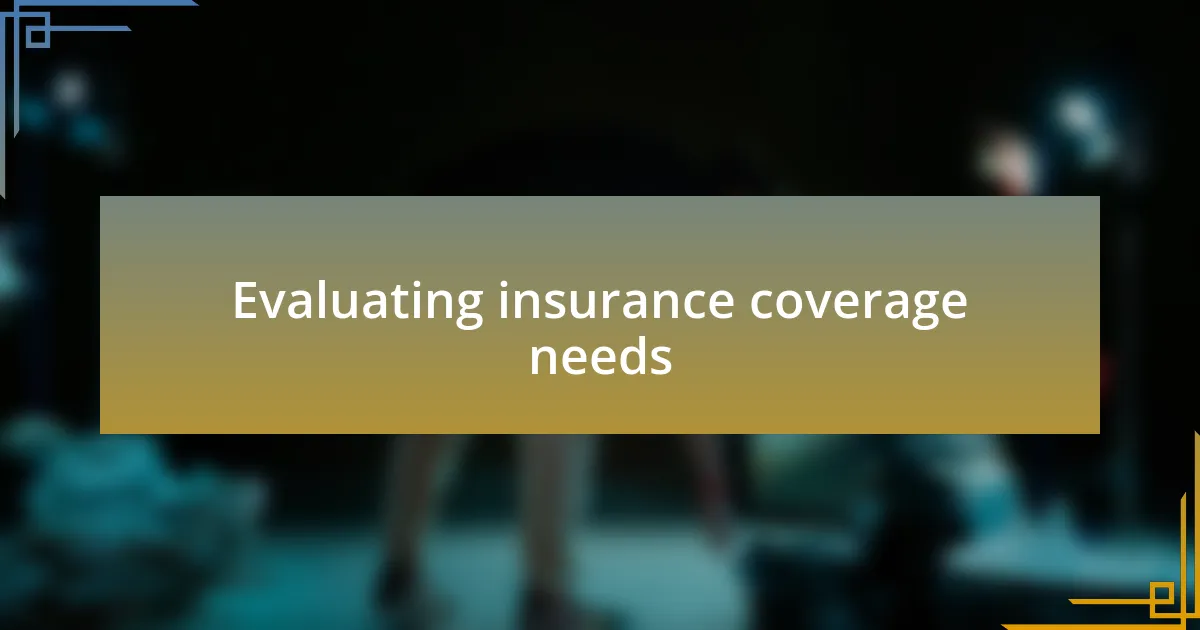
Evaluating insurance coverage needs
When evaluating my insurance coverage needs, I reflected on the potential risks that could disrupt my plans. I remember sitting down with a notepad, listing everything that could go wrong—from a vendor no-show to inclement weather. The more I noted, the clearer it became that having solid protection was more than just an expense; it was a layer of security that allowed me to breathe easier in the planning process.
I was particularly drawn to the idea of “all-perils” coverage as it seemed like a safety net for every possible mishap. Picture this: it’s the rehearsal dinner, and a freak storm rolls in. Wouldn’t it be a relief to know that I wouldn’t be financially devastated if we had to change venues last minute? I found that evaluating these scenarios made me appreciate the peace of mind that came with comprehensive coverage.
Budget constraints are always a consideration, and I had to make some tough choices. I recall weighing the cost of higher coverage against the potential loss if something went wrong. It felt like investing in my happiness; after all, wouldn’t you prefer to focus on celebrating your love rather than worrying about what comes next? Knowing I had my bases covered allowed me to enjoy the lead-up to my wedding instead of stressing over “what ifs.”
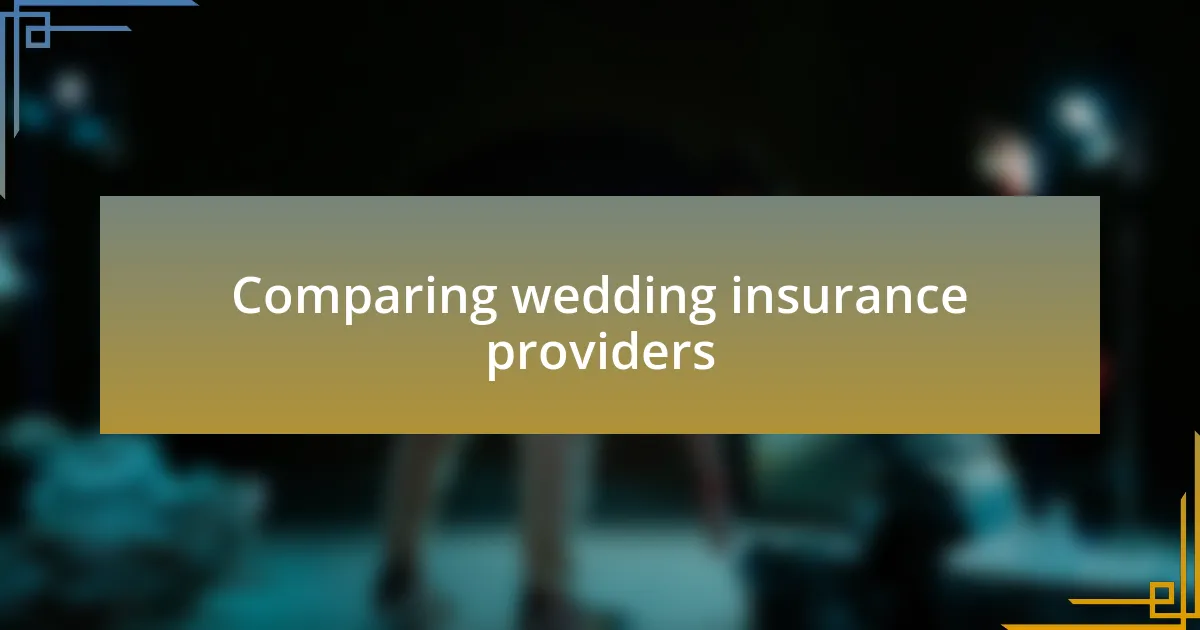
Comparing wedding insurance providers
When I started comparing wedding insurance providers, I was met with a whirlwind of options—each claiming to offer the best coverage. It felt overwhelming at times. I remember visiting several websites and jotting down features, but what really struck me was how varied the premiums could be for similar levels of coverage. I found it crucial to look beyond just the numbers and evaluate the customer service reputation behind those policies. After all, who wants to deal with a company that leaves you hanging when you need help the most?
One provider stood out to me because they had a wealth of positive reviews that highlighted their responsiveness and support during filing claims. I can’t emphasize enough how comforting it was to read that others had a smooth experience, especially in moments of stress. It made me wonder—what good is a policy if the provider isn’t easily accessible when you need them? So, I took careful notes of consumer feedback, which played a significant role in my final decision.
Ultimately, I crafted a comparison chart that laid out all my findings side by side. It was a simple, yet effective tool. I included coverage details, customer service ratings, and even the cancellation policies, which turned out to be a big deal for me. Reflecting on my choices, I realized that choosing the right provider was about more than just protecting my day; it was about choosing a partner who would stand by me in case of the unexpected.
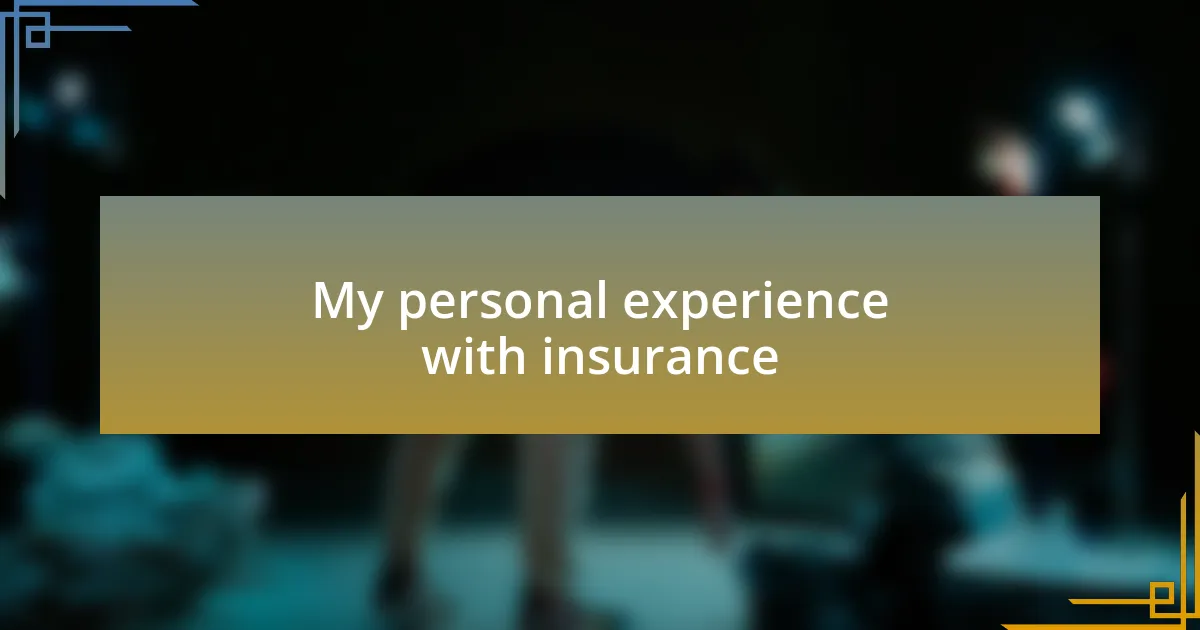
My personal experience with insurance
As I delved deeper into my wedding insurance journey, I felt a wave of uncertainty wash over me. One evening, after a long day of research, I found myself staring at my laptop, overwhelmed by the different policies and jargon—what even is “aggregate limit”? It wasn’t just about the coverage; it was about how I would feel on my big day, knowing I had the right safety net in place.
I distinctly remember one night when I reached out for help from a friend who had been through the wedding planning trenches. Their recommendation to speak directly with insurance agents rather than just reading the FAQs online was an eye-opener. Having those one-on-one conversations made me feel more grounded. I could ask questions that mattered to me, and I walked away with a sense of reassurance that I simply couldn’t find in a policy document.
In the end, I chose a provider whose agent took the time to genuinely understand my concerns. Their willingness to explain complex terms in plain language eased my anxiety considerably. It made me think, doesn’t peace of mind hold equal importance to the actual policy? That sense of trust played a pivotal role in my decision-making, transforming an initially daunting task into a stepping stone toward a joyous occasion.